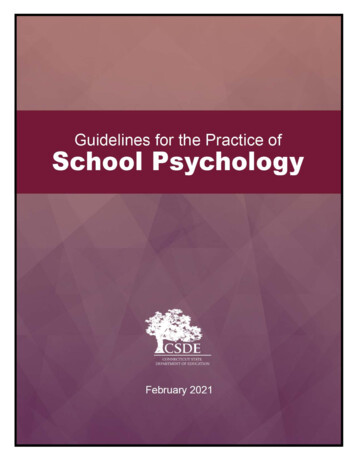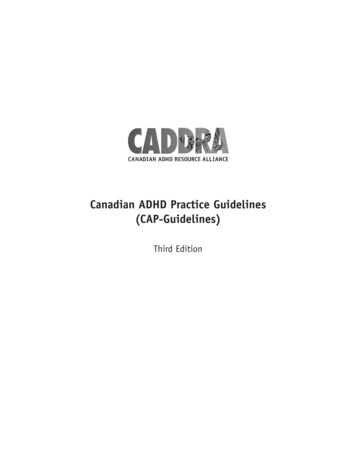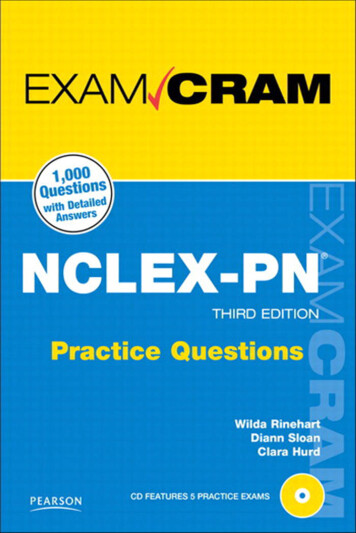
Transcription
ContentsPreface . 1Acknowledgments . 2Introduction to the Practice of School Psychology in Connecticut . 4Mission . 5Philosophy . 5Scope of Practice for Connecticut School Psychologists . 6Standards and Domains of School Psychology Leadership and Function . 7Standard 1: Practices That Permeate All Aspects of Service Delivery . 7Domain 1: Databased Decision-Making and Accountability . 7Domain 2: Consultation and Collaboration . 8Standard 2: Direct and Indirect Services for Children, Families, and Schools . 8Domain 3: Interventions and Instructional Support to Develop Academic Skills . 8Domain 4: Interventions and Mental Health Services to Develop Social and Life Skills . 9Domain 5: School-Wide Practices to Promote Learning. 9Domain 6: Preventive and Responsive Services . 9Domain 7: Family and School Collaboration Services . 10Standard 3: Foundations of School Psychological Service Delivery . 10Domain 8: Diversity in Development and Learning. 10Domain 9: Research and Program Evaluation . 11Domain 10: Legal, Ethical, and Professional Practice . 11Principles for Professional Ethics of School Psychologists . 12Adjudication . 12Other Resources . 12Best Practices . 12Making Optimal Use of School Psychological Services . 13Staffing Ratios . 13Caseload vs. Workload . 13Supervision, Professional Development, and Evaluation . 15Administrative vs. Clinical Supervision . 15Administrative Supervision. 15Clinical Supervision . 15Qualifications and Training of Clinical Supervisors. 16Professional Development . 17Evaluation. 18Future Trends and Best Practice in School Psychological Services . 21Connecticut State Department of Education Guidelines for the Practice of School Psychologyii
Overview . 21Evaluation in the 21st Century . 21Reciprocity for School Psychology Certification. 22School Psychology in the Private Sector . 23Self-Care: The Missing Link in Best Practice . 24Culturally and Linguistically Diverse Students . 25Overview . 25Assessment Practices . 25References . 28The Connecticut State Department of Education is committed to a policy of affirmative action/equal opportunity for all qualifiedpersons. The Connecticut State Department of Education does not discriminate in any employment practice, education program, oreducational activity on the basis of age, ancestry, color, civil air patrol status, criminal record (in state employment and licensing),gender identity or expression, genetic information, intellectual disability, learning disability, marital status, mental disability (past orpresent), national origin, physical disability (including blindness), race, religious creed, retaliation for previously opposeddiscrimination or coercion, sex (pregnancy or sexual harassment), sexual orientation, veteran status or workplace hazards toreproductive systems, unless there is a bona fide occupational qualification excluding persons in any of the aforementionedprotected classes.Inquiries regarding the Connecticut State Department of Education’s nondiscrimination policies should be directed to:Levy GillespieEqual Employment Opportunity Director/Americans with Disabilities Act (ADA) CoordinatorConnecticut State Department of Education450 Columbus Boulevard, Suite 505Hartford, CT 06103860-807-2071Levy.Gillespie@ct.govConnecticut State Department of Education Guidelines for the Practice of School Psychologyiii
PrefaceThe twenty-first century has proven to be both a time of great opportunity and challenges for the youth oftoday. To help students navigate the educational process, we must provide opportunities that are diverseand provide resources that enhance their experiences within the school environment and beyond. While itis clear that academic proficiency is our optimal goal, it is vital to recognize the importance of guidingstudents through the development of their whole selves. This encompasses not only strong academicrigor but also emotional and social skills that will yield productive and responsible members of an everchanging world.Academic success is influenced by a multitude of factors including equitable and effective instruction,motivation, interpersonal relationships (home and school), capacity to cope with emotional challenges,stress, resiliency, disabilities, socioeconomic latitude, and cultural and linguistic factors (Gore, Leuwerke,Metz, Brown, & Kelly, 2019; Schluter, Pinnow, Voelkle, Gunturkun, Genc, 2018; Stadtfeld, Elmer, Boda, &Raabe, 2019).School psychologists: are uniquely positioned to prepare students to meet the changing demands of the world in whichthey live;have specialized training in both psychology and education, which extends their expertise farbeyond the most familiar role of conducting evaluations to determine special educational needs;can support the social, emotional, and academic learning goals of all students, and provideservices that impact learning at the individual, small group, classroom, building or school districtlevel; andcollaborate with administrators, teachers, school specialists, parents and other healthprofessionals to ensure that every child learns in a safe, healthy, and supportive environment.These guidelines delineate the many ways school psychologists can support the educational process.Given the challenges of contemporary education, we cannot afford to overlook or underutilize thisimportant resource. Schools psychologists can make significant contributions to the learning and healthydevelopment of children and adolescents.Connecticut State Department of Education Guidelines for the Practice of School Psychology1
AcknowledgmentsProject Managers:Jocelyn Mackey, Ph.D.Michael Regan, Ph.D., NCSPEducation ConsultantCooperative Educational ServicesConnecticut State Department of EducationDirector of Special EducationSchool PsychologistBilingual School PsychologistAdvisory Team and Writing Committee:Althea Barnes, M.A.Steven Mendelssohn, M.A., CASSupervisor of Student ServicesClinton Public SchoolsManchester Public SchoolsSchool PsychologistSchool PsychologistPresident-Elect, Connecticut Association ofSchool PsychologistsRonald Benner, NCSPBridgeport Public SchoolsMary-Paule Monks, M.Ed.School PsychologistConnecticut Technical Education andCareer SystemH. Thomas Brant, M.A., CASCoordinator of Special EducationStratford Public SchoolsPresident, Connecticut Association of SchoolPsychologistsSchool PsychologistShamim Patwa, Ph.D.Mansfield Public SchoolsDirector of Special EducationSchool PsychologistEric Elias, M.Ed.Meriden Public SchoolsVeronica Scarfi, Ph.D.School PsychologistHartford Public SchoolsSchool PsychologistHenry Galarraga, M.A., CASConnecticut Technical Education and CareerSystemBilingual School PsychologistConnecticut State Department of Education Guidelines for the Practice of School Psychology2
Special thanks for providing material and review of guidelines are extended to:Chris Brown, M.S.Christine KuehlewindDirector of Student ServicesState Education Resource CenterWatertown Public SchoolsSchool PsychologistElaine O’Connor, CAGSHartford Public SchoolsPaula Catuogno, M.S., NCSPSchool PsychologistConsolidated School District of New BritainSchool PsychologistCynthia Rutledge, Ed.D.School Psychologist (retired)Eric Colón-Rodríguez, Ph.D.Bilingual School Psychologist (retired)Terry Williams, Ph.D.School Psychologist (retired)Jo Ann Freiberg, Ph.D.Education Consultant (retired)Nattaneal WilsonConnecticut State Department of EducationState Education Resource CenterPaula Gill López, Ph.D.Director, School Psychology ProgramDepartment of Psychological andEducational ConsultationFairfield UniversityConnecticut State Department of Education Guidelines for the Practice of School Psychology3
Introduction to the Practice of School Psychologyin ConnecticutThe discipline of psychology is central to teaching, learning, and child development. School psychology isa specialized area of professional psychology concerned with the science and practice of psychology withchildren, youth, families; learners of all ages; and the schooling process. 1 School psychologists servicechildren and youth as they develop and discover their educational world socially, emotionally, andacademically.The evolution of school psychology has transformed the focus of school-based psychological services toencompass best practices in assessment, behavioral interventions, and educational programming. Ourcurrent paradigm of school psychology is characterized by 2: an emphasis on consultation, functional behavioral assessment, curriculum-based measurement,and ecological assessment of learner/environment systems applied to the design of instructional,social, emotional and behavioral interventions;a focus on service outcomes, accountability, and databased decision-making that linksassessment directly to empirically supported interventions;a focus on wellness, social and emotional well-being, prevention, counseling and buildingcompetencies;a systemic approach to the enhancement of climate, culture and restorative practices thatultimately improve achievement outcomes; anda systemic orientation characterized by the provision of a comprehensive, integrated program ofschool psychological services to all learners, their families, and those who serve them.School districts and practitioners are encouraged to review the National Association of SchoolPsychologist’s Practice Model (NASP Practice Model). 3 Understanding the standards and domains ofpractice helps inform the range of knowledge and skills school psychologists have and outlines howservices are integrated to best meet the needs of students, families, and the school community. logy/who-are-school-psychologists3 iew4 https://www.nasponline.org/x40589.xml12Connecticut State Department of Education Guidelines for the Practice of School Psychology4
MissionSchool psychologists partner with families, teachers, school administrators, and other professionals tocreate safe, healthy, and supportive learning environments that strengthen connections between home,school, and the community.PhilosophyAll children and youth have the right to be educated in a safe and nurturing school environment thatpromotes positive educational and social-emotional development. School psychologists respect, engage,and challenge all students to become motivated, confident, and creative lifelong learners. Schoolpsychologists foster a climate that nurtures and values diversity, equity, and critical thinking. Schoolpsychologists collaborate with key stakeholders in families, schools, and communities to promote thehealthy development of all children and youth. School psychologists have unique training thatencompasses learning and cognition, as well as social and emotional development, providing anintegrated perspective of service within the context of the school. School psychologists protect the rightsof children and their families, respect individual differences, and recognize that diversity contributes to astrong and just society. School psychologists promote early interventions and databased decision-makingto support children and families.Connecticut State Department of Education Guidelines for the Practice of School Psychology5
Scope of Practice for Connecticut SchoolPsychologistsSchool psychologists work with students and their families to support students’ social, emotional, andbehavioral health. School psychologists’ broad training in the core areas of psychology and educationplace them in the unique and ideal position to integrate and coordinate educational, psychological, andbehavioral health services. 5 Research has shown that students who receive this type of support achievebetter academically in school (Durlak, Weissberg, Dymnicki, Taylor, & Schellinger, 2011; Welsh, Parke,Widaman, & O'Neil, 2001; Zins, Bloodworth, Weissberg, & Walberg, 2004). The vast majority of schoolpsychologists work in public school settings. However, some also provide services in universities,research organizations, public service agencies, and private practice (Castillo, Curtis, &. Gelley, 2012).School psychologists also work with school-based teams to support the academic success of studentsthrough a variety of means including consultation and review of student performance data.School psychologists are experts in addressing barriers to educational success and are critical membersof school teams. As experts in both mental health and education, school psychologists are invaluable tostudents, schools, and families in providing a multitude of interventions that contribute to student success(e.g. supporting academic and social-emotional learning, addressing positive school climates, enhancingacademic engagement, promoting positive behavioral supports). When school psychologists aresupported in practicing the broad-based role as articulated by the NASP Practice Model, students andschools are more likely to have access to these professional activities and student outcomes areenhanced. ticut State Department of Education Guidelines for the Practice of School Psychology6
Standards and Domains of School PsychologyLeadership and FunctionThe National Association of School Psychologists (NASP), 7 the American Psychological Association(APA) Division 16, 8 and the Connecticut State Department of Education (CSDE) 9 outline the scope ofpractice of school psychologists to ensure delivery of comprehensive school psychological services. Theorganization of this section borrows directly from the NASP conceptualization of domains of schoolpsychology practice, which promotes the shift toward a more comprehensive model of schoolpsychological services that will have the effect of promoting better outcomes for all students. 10 Alignmentwith these domains is also consistent with the Connecticut Common Core of Teaching (CCT) Rubric forEffective Service Delivery 2014, Evidence Guide for School Psychologist. 11The scope of practice for school psychologists can be summarized under three standards with 10 generaldomains. School psychologists have competence and proficiency in all of the domains, though not all mayhave the highest level of expertise in all aspects of each domain. Individual school psychologists will havedistinct subspecialties or areas of expertise across the 10 domains.Standard 1: Practices That Permeate All Aspects of Service DeliveryDomain 1: Databased Decision-Making and AccountabilitySchool psychologists have knowledge of varied models and methods of assessment and data collection foridentifying strengths and needs, developing effective services and programs, and measuring progress andoutcomes. As part of a systematic and comprehensive process of effective decision-making and problemsolving that permeates all aspects of service delivery, school psychologists demonstrate skills to usepsychological and educational assessment, data collection strategies, and technology resources and applyresults to design, implement, and evaluate direct interventions, psychological services, and programs.Examples of professional practices include: Using the problem-solving framework as the basis for all practices.Systematically collecting data from multiple sources and using ecological factors as the contextfor all assessment and intervention decisions.Using assessment data to understand students’ problems and to implement evidence-basedinstructional, mental, and behavioral health services.Using data to analyze progress toward meeting academic and behavioral goals.Evaluating treatment fidelity of student interventions.Evaluating the effectiveness and/or need for modifications to school-based interventions apa.org/about/division/div16.aspx9 https://portal.ct.gov/SDE/Talent Office/Talent-Office-home-page10 iew/nasp-practice-model-10-domains11 https://portal.ct.gov/-/media/SDE/SEED/Evidence Guides/school psychologist.pdf?la en78Connecticut State Department of Education Guidelines for the Practice of School Psychology7
Conducting valid and reliable assessments to identify students’ eligibility for special educationservices.Domain 2: Consultation and CollaborationSchool psychologists have knowledge of varied models and strategies of consultation, collaboration, andcommunication applicable to individuals, families, schools and systems, and methods to promote effectiveimplementation of services. As part of a systematic and comprehensive process of effective decisionmaking and problem solving that permeates all aspects of service delivery, school psychologistsdemonstrate skills to consult, collaborate, and communicate effectively with others.Examples of professional practices include: Using a consultative problem-solving process for planning, implementing, and evaluating allinstructional, and mental and behavioral health services.Facilitating effective communication and collaboration among families, teachers, communityproviders, and others.Using consultation and collaboration when working at the individual, classroom, school, orsystems levels.Advocating for needed change at the individual student, classroom, building, district, state, ornational levels.Standard 2: Direct and Indirect Services for Children, Families, andSchoolsStudent-Level ServicesDomain 3: Interventions and Instructional Support to Develop Academic SkillsSchool psychologists have knowledge of biological, cultural, and social influences on academic skills;human learning, cognitive, and developmental processes; and evidence-based curricula and instructionalstrategies. School psychologists, in collaboration with others, demonstrate skills to use assessment anddata collection methods and to implement and evaluate services that support cognitive and academicskills.Examples of professional practices include: Implementing evidence-based interventions to improve student engagement and learning.Using assessment data to develop and implement evidence-based instructional strategies thatwill improve student performance.Working with other school personnel to ensure attainment of state and local benchmarks for allstudents.Sharing information about research in curriculum and instructional strategies.Promoting the use of instructional strategies for diverse learners and to meet individual learningneeds.Connecticut State Department of Education Guidelines for the Practice of School Psychology8
Domain 4: Interventions and Mental Health Services to Develop Social and Life SkillsSchool psychologists have knowledge of biological, cultural, developmental, and social influences onbehavior and mental health, behavioral and emotional impacts on learning and life skills, and evidencebased strategies to promote social-emotional functioning, and mental and behavioral health. Schoolpsychologists, in collaboration with others, demonstrate skills to use assessment and data collectionmethods and to implement and evaluate services that support socialization, learning, mental andbehavioral health.Examples of professional practices include: Providing a continuum of mental and behavioral health services, including individual and groupcounseling, behavioral coaching, positive behavioral supports, and parent education.Integrating behavioral supports and mental health services with academic and learning goals forstudents.Facilitating the design and delivery of curricula to help students develop effective skills, such asself-regulation, planning, organization, empathy, social skills, and decision-making.Using systematic decision-making to consider the antecedents, consequences, functions, andcauses of behavioral difficulties.Developing and implementing behavior change programs at individual, group, classroom, andschool-wide levels.Evaluating evidence-based interventions to improve individual student social, emotional, andbehavioral wellness.Systems-Level ServicesDomain 5: School-Wide Practices to Promote LearningSchool psychologists have knowledge of school and systems structure, organization, and theory; generaland special education; technology resources; and evidence-based school practices that promote learningand mental and behavioral health. School psychologists, in collaboration with others, demonstrate skills todevelop and implement practices and strategies to create and maintain effective and supportive learningenvironments for children and others.Examples of professional practices include: Using knowledge of universal screening programs to identify students in need of instructional andbehavioral support services.Promoting policies and practices that support effective discipline, instructional support, grading,home-school partnerships, student transitions, and more.Collaborating with other school personnel to create and maintain a multi-tiered continuum ofservices to support academic, social, emotional, and behavioral goals for students.Advocating for policies and practices that promote positive school environments.Domain 6: Preventive and Responsive ServicesSchool psychologists have knowledge of principles and research related to resilience and risk factors inlearning and mental health, services in schools and communities to support multi-tiered prevention, andevidence-based strategies for effective crisis response. School psychologists, in collaboration with others,demonstrate skills to promote services that enhance learning, mental and behavioral health, safety, andConnecticut State Department of Education Guidelines for the Practice of School Psychology9
physical well-being through protective and adaptive factors and to implement effective crisis preparation,response, and recovery.Examples of professional practices include: Using knowledge of risk and protective factors to address problems such as school completion,truancy, bullying, youth suicide, and school violence.Developing, implementing, and evaluating prevention and intervention programs that addressprecursors to severe learning and behavioral problems.Participating in school crisis prevention and response teams.Domain 7: Family and School Collaboration ServicesSchool psychologists have knowledge of principles and research related to family systems, strengths,needs, and culture; evidence-based strategies to support family influences on children’s learning, mentaland behavioral health; and strategies to develop collaboration between families and schools. Schoolpsychologists, in collaboration with others, demonstrate skills to design, implement, and evaluate servicesthat respond to culture and context and facilitate family and school partnerships and interactions withcommunity agencies for enhancement of academic and social-behavioral outcomes for children.Examples of professional practices include: Collaborating with and engaging parents in decision-making about their children.Promoting respect and appropriate services for cultural and linguistic differences.Promoting strategies for safe, nurturing, and dependable parenting and home interventions.Creating links among schools, families, and community providers.Standard 3: Foundations of School Psychological Service DeliveryDomain 8: Diversity in Development and LearningSchool psychologists have knowledge of individual differences, abilities, disabilities, and other diversestudent characteristics; principles and research related to diversity factors for children, families, andschools, including factors related to culture, context, and individual and role difference; and evidencebased strategies to enhance services and address potential influences related to diversity. Schoolpsychologists provide professional services that promote effective functioning for individuals, families, andschools with diverse characteristics, cultures, and backgrounds and across multiple contexts.Understanding and respect for diversity in development and learning, and advocacy for social justice, arefoundations for all aspects of service delivery.Examples of professional practices include: Addressing individual differences, strengths, backgrounds, and needs in the design,implementation, and evaluation of all services.Using a problem-solving framework for addressing the needs of English language learners.Promoting fairness and social justice in school policies and programs.Connecticut State Department of Education Guidelines for the Practice of School Psychology10
Domain 9: Research and Program EvaluationSchool psychologists have knowledge of research design, statistics, measurement, varied data collectionand analysis techniques, and program evaluation sufficient for understanding research and interpretingdata in applied settings. School psychologists demonstrate skills to evaluate and apply research as afoundation for service delivery and, in collaboration with others, use various techniques and technologyresources for data collection, measurement, and analysis to support effective practices at the individual,group, and/or systems levels.Examples of professional practices include: Using research findings as the foundation for effective service delivery.Using techniques of data collection to evaluate services at the individual, group, and systemslevels.Assisting teachers in collecting meaningful student data.Applying knowledge of evidence-based interventions to evaluate the fideli
The discipline of psychology is central to teaching, learning, and child development. School psychology is a specialized area of professional psychology concerned with the science and practice of psychology with children, youth, families; learners of all ages; and the schooling process .1. School psychologists service











